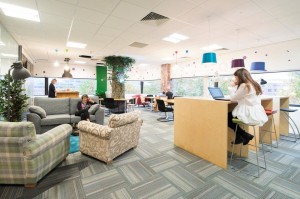Twenty per cent of all office space let in Bristol this year is likely to be used for a new generation of flexible co-working hubs as the move towards new forms of business accommodation gathers pace.
New research by international property consultancy JLL, which has an office in Bristol, reveals that major new co-working spaces launched this year are expected to account for 120,000 sq ft of the 600,000 sq ft total office space let in the city by the end of 2018. 
The firm described the rise of flex space as one of the biggest shifts across the real estate industry it had ever seen.
This is in marked contrast to just a few years ago when such space was highly unusual.
While pioneering schemes such as the original Hub in Bush House and Co-exist at Hamilton House gave Bristol a new form of shared workspace, they tended to be used by freelancers or micro-businesses in the creative, cultural and environmental sectors.
However, starting in London’s Silicon Roundabout tech hub, traditional property firms and serviced office suppliers have embraced co-working and now few office schemes are launched without an element of shared space – usually decorated in bright colours and with large, open kitchens which double up as meeting places and often with table football or ping pong tables.
Key players to open recently in Bristol have been the second Desklodge, in the former Unum building on Redcliffe Way, following the success of its first venture on one floor of 1 Temple Way – and Runway East, off Bristol Bridge, while another two sites are ‘under offer’ to co-working providers in the city centre.
Other recently opened spaces in the city include Origin Workspace in Berkeley Square and HERE in the former HTV studios on Bath Road.
Further ahead, 90 converted shipping containers are to be used to create a co-working scheme in the new Wapping Wharf harbourside quarter.
JLL’s research unpicks the main drivers of the sector’s boom – including evolutionary changes in how, when and where people work, shifts in lifestyle, and rapid advancements in technology – and provides unique insights into the risks and rewards for both companies occupying the space and property investors.
The research also reveals that flexible office space market, or ‘flex space’, has more than doubled in size since 2014 across Europe with it predicted to grow by up to 30% a year over the next five years, according to JLL’s new report Disruption or Distraction.
The growing popularity of co-working space has also given rise to a new hybrid commercial space product.
Conventional landlords are in some cases offering fully fitted-out office space with telecoms cabling, broadband and high-spec interior design, ready for companies to move into, rather than the conventional model of occupiers taking a lease and then carrying out their own fit-out.
Hannah Waterhouse, director in JLL’s Bristol office, said co-working space was here to stay.
“It’s been pretty staggering to see the shift in the Bristol market – with 20% of all office letting deals this year expected to go to flexible co-working space. And whilst it has its practical challenges for business, it’s definitely more than a fad,” she said.
“Flexible work space offers businesses, from start-ups and freelancers to major companies and international corporates, bright, open places where people work, meet, network and collaborate.”
With some really exciting new places now on offer here, it was not hard to see why Bristol was named third best in the UK for co-working space last month by price comparison website MoneySuperMarket, she said.
“The traditional offices market is playing catch up and the irony is that many younger businesses and start-ups have actually been pushed into taking flexible co-working space because conventional premises have stuck to rigid terms,” Hannah added.
“If they haven’t had three years’ worth of accounts or the ability to commit to a long-term lease, then conventional office space has remained out of reach to many. The market has certainly woken up to that, with investors and owners becoming much more creative and flexible in their approach.”
JLL head of flex space, EMEA, Dan Brown said: “The rise of flex space is resulting in one of the biggest shifts across the real estate industry that we’ve ever seen. The consumerisation of real estate, which we’ve already witnessed in hospitality and retail, is reshaping business models and investment strategies alike.
“Our research shows how different markets and different companies are moving at varying speeds, and as the dramatic growth showing no signs of slowing, companies, investors and developers must keep on top of the evolution to understand what this means for their specific business ambitions.”





























